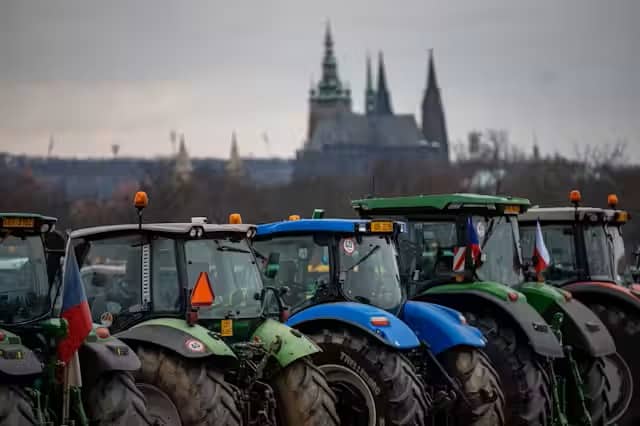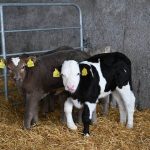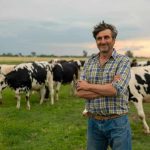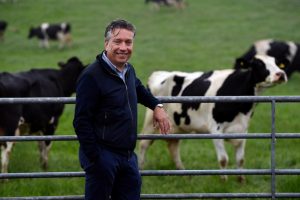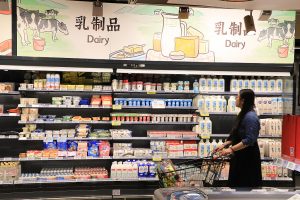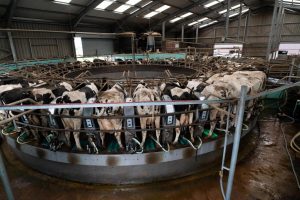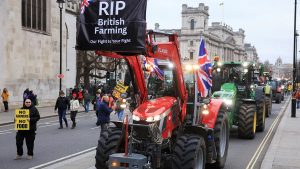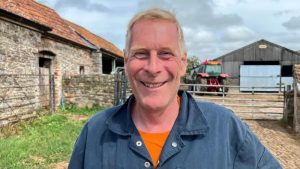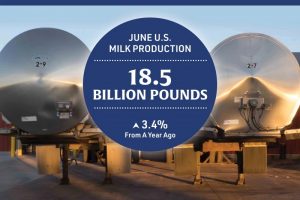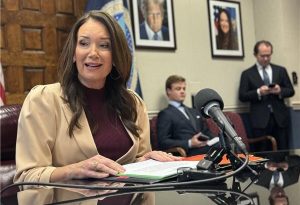
A crisis is brewing in the systems that feed us.
More than a third of humanity’s greenhouse gas emissions come from the way we produce, process and package food. It’s also the biggest driver of the diminishing variety of life on Earth. Solving these problems will require root-and-branch reform of farming. But so far, the burden has fallen on relatively slight shoulders: individual farmers and you, the consumer.
Across Europe, widespread frustration in rural communities is boiling over into anger that could derail efforts to make farming more sustainable, with protests against environmental measures emerging in countries including France, Germany, the Netherlands and, most recently, Wales.
Modern farming methods consume natural habitat and douse soil, crops and seeds with chemical fertilisers and pesticides. There are forms of farming that merge habitats and crops and endow the soil with nutrients by other means, like planting more crops capable of turning airborne nitrogen into a biologically useful form, such as legumes.
So why aren’t more farmers embracing these changes?
Farming on the edge
“Governments are obliged to meet net zero targets while farmers are clinging to their livelihoods in a difficult economic climate,” says Alex Heffron, a PhD candidate in geography at Lancaster University.
“Farmers receive very little of the retail value of their produce. Dairy farmers in the UK typically receive less than 1p of the retail value of a 480g block of cheese.”

The profits farmers can hope to make from growing food are being squeezed by the rising costs of feed, fuel and fertiliser, not to mention interest rates and energy, Heffron says. Many regard new regulations and reforms from European governments, designed to incentivise greener farming, as the final straw.
Welsh farmers once had their work subsidised according to the amount of land they managed. New subsidy schemes in England and Wales aim to pay farmers for public goods instead, like how much habitat they can create or carbon they can store.
The Welsh scheme would ask farmers to plant trees on 10% of their land in order to receive payments. Heffron argues that tenant farmers might not get permission from landowners to do this, while those with mortgages may be refused by banks concerned with what tree planting will do to the land’s value.
The scheme may not ultimately benefit food production or the environment, he warns:
“With declining subsidy levels, some UK farmers will be forced to sell up. Some farms are already being bought by large investment funds for timber production and the sale of carbon credits to companies looking to ‘offset’ their emissions, a practice that has been criticised as greenwashing.”
A 2019 analysis by earth system scientists Simon Lewis (University of Leeds) and Charlotte Wheeler (University of Edinburgh) found that such timber plantations are a pale imitation of forests that regenerate naturally, as they store a tiny fraction of carbon by comparison.
“The scale of this challenge demands a new form of politics, rooted not in austerity but renewed public spending on food and farming systems, combined with prompt action against the parts of the supply chain that are hoarding all the profits,” Heffron says.
Whose job is it?
A handful of companies control the supply chains that gather food, process and sell it. Walmart dominates the grocery market in the US whereas Tesco commands 27% of the UK’s equivalent.
When such a company announces it will achieve net zero emissions by a particular date, for example, it is workers at each link in that supply chain who must do the heavy lifting. Unfortunately, their employers may lack the necessary means says Albert Boaitey, a lecturer in global agri-food supply chains, Newcastle University.
“For instance, a cattle farm in Brazil that supplies beef to a transnational retailer overseas would be obliged to comply with emission-reduction measures imposed by [the] retailer,” he says. For example, investing in selective breeding programmes that produce cattle that eat less feed and belch less greenhouse gas.
Boaitey’s research suggests farmers are unlikely to make these changes if beef processors (typically large firms downstream in the supply chain) do not pay for them. He highlights a report by Barclays bank which found UK retailers cancelled contracts with suppliers worth more than £7 billion in 2021 for their failure to keep up with sustainability standards.

“Even though our results were published a few years ago, the situation remains largely unchanged,” he says.
You may have noticed that the onus for building a sustainable food system is also falling on you. With promotional campaigns urging you to plump for plant-based alternatives to meat and dairy, the calculation seems to be that consumer demand alone can engineer a shift away from the most harmful food operations.
But how realistic is this? How much power really lies in the supermarket aisle? Global food system researcher Benjamin Selwyn at the University of Sussex is sceptical, arguing that many of the companies making vegan burgers and yoghurts are also big producers of beef, milk and cheese.
The kind of food we grow and how we grow it must change radically. Heffron argues that a coordinated response that seeks to transform the food system in its entirety is the only way to do this, and that states and the large companies which dominate these complex systems (and much of their revenue) are best placed to lead the way.
While the responsibility remains on cash-strapped producers and consumers at opposite ends of food supply chains, business-as-usual will continue.
You can now read the most important #news on #eDairyNews #Whatsapp channels!!!
🇺🇸 eDairy News INGLÊS: https://whatsapp.com/channel/0029VaKsjzGDTkJyIN6hcP1K
